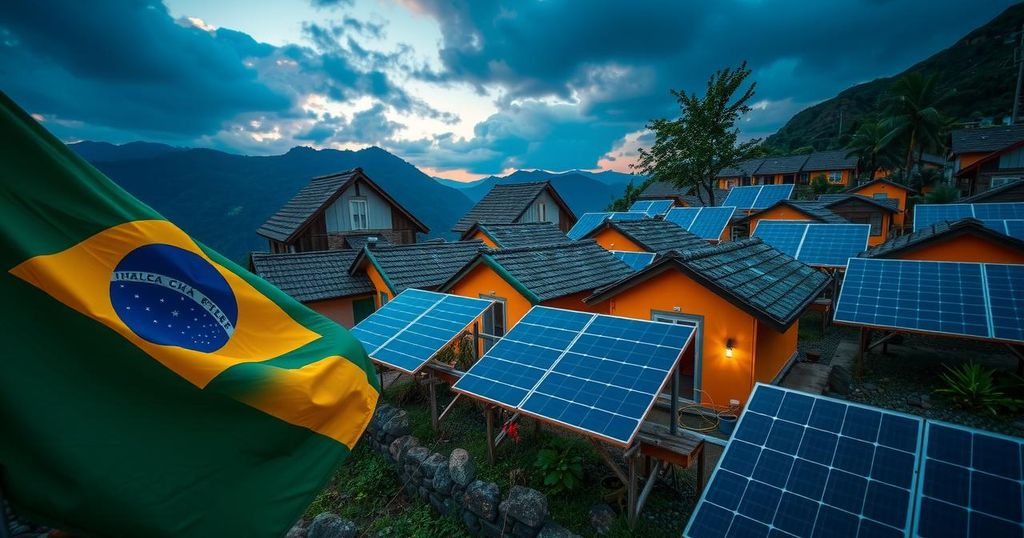Cars
ABVE, AMAZONAS, ASIA, BEIJING, BELO MONTE, BRASILIA, BRAZIL, BRAZILIAN ELECTRIC VEHICLE ASSOCIATION, BY, BYD, CEARA, CHINA, CHINA STATE POWER INVESTMENT CORPORATION, ENERGY, FELIPE CAMARGO GAIOTTO, GREEN HYDROGEN, INDUSTRY, MANAUS, MEXICO, NORTH AMERICA, PANATI, PEOPLE ' S DAILY, RENEWABLE ENERGY, RIO DE JANEIRO, SAO PAULO, SOUTH AMERICA, SPIC, STATE GRID CORPORATION OF CHINA
Fatima Khan
0 Comments
China-Brazil Cooperation Fuels Green Energy Initiatives and Electric Vehicle Adoption
China and Brazil are advancing green energy cooperation with the Panati photovoltaic power station in Ceara, providing clean energy to over 350,000 households. Collaboration includes ultra-high-voltage transmission projects and growing sales of electric vehicles, particularly from Chinese manufacturers. Local production of electric vehicle batteries facilitates further integration of green technologies, positively impacting the country’s public transport electrification efforts.
On November 18, 2024, it was reported by the People’s Daily that the Panati photovoltaic power station in Ceara, Brazil, operates 446,000 solar panels across 840 hectares. Developed by the Brazil branch of China State Power Investment Corporation (SPIC), this facility commenced operations in June 2024, providing clean energy to over 350,000 households annually. In light of Brazil’s governmental push toward a green energy transition, collaboration in clean energy has significantly increased between China and Brazil. The completion of the first and second phases of the Belo Monte ultra-high-voltage transmission project, undertaken by the State Grid Corporation of China, now enables the transportation of hydroelectric resources from Brazil’s North to its Southeast region. In December 2023, this corporation secured rights to another ultra-high-voltage direct current transmission project, focused on transferring renewable energy such as wind and solar from Brazil’s Northeast to key areas including Brasília. As numerous green power initiatives flourish, the Brazilian landscape showcases electric “highways” facilitating energy distribution. Brazilian scholar Felipe Camargo Gaiotto highlighted the synergy between Brazil’s experience in hydropower and China’s expertise in solar, wind, and electricity transmission as integral for advancing global sustainability. As renewable energy improves living conditions, green transportation is gaining traction, particularly through the adoption of electric vehicles in major cities like São Paulo and Rio de Janeiro. Statistics from the Brazilian Electric Vehicle Association (ABVE) reveal that over 120,000 light electric vehicles were sold in Brazil during the first nine months of the current year, reflecting a year-on-year increase of 113 percent. Notably, eight of the top ten best-selling models are from China. Additionally, the presence of BYD in Brazil has enhanced local capabilities, as the company established a battery production facility in Manaus, the capital of Amazonas state. This facility, which became operational in 2020, is the first plant for lithium iron phosphate battery assembly in Brazil, designed to produce battery modules for 1,000 electric buses annually. This local assembly promotes the adoption of green technologies and expedites public transportation electrification, thereby fostering the development of local new energy technologies.
The collaboration between China and Brazil in the field of green energy is characterized by significant investments in renewable energy projects aimed at reducing carbon emissions and contributing to sustainable development. Brazil’s rich hydropower resources and growing solar and wind capabilities offer ample opportunities for bilateral cooperation in clean energy technologies. The involvement of Chinese companies, such as the State Grid Corporation and SPIC, reflects a mutual interest between the countries to support each other’s transition toward greener economies. This partnership is crucial in addressing global climate change challenges and advancing the adoption of electric vehicles to complement renewable energy initiatives.
The partnership between China and Brazil in renewable energy exemplifies a successful model of international cooperation aimed at fostering sustainable development. Through significant investments in solar, wind, and hydroelectric resources, both nations are progressively advancing toward their green energy goals. The increasing market presence of electric vehicles, particularly those produced by Chinese automakers, further underscores the shift towards greener transportation. This ongoing collaboration not only benefits local communities by providing clean energy but also contributes to the global effort of climate change mitigation, showcasing the potential of international partnerships.
Original Source: www.cnhinews.com




Post Comment